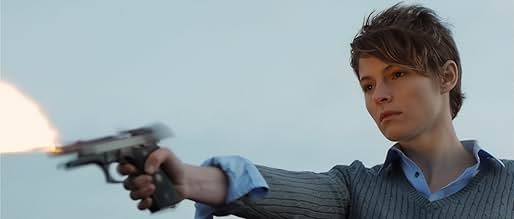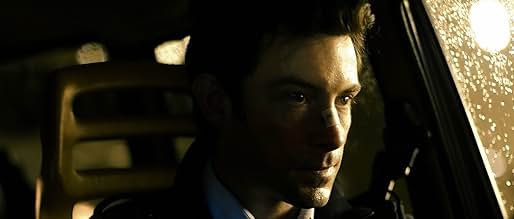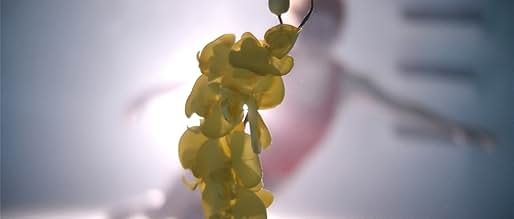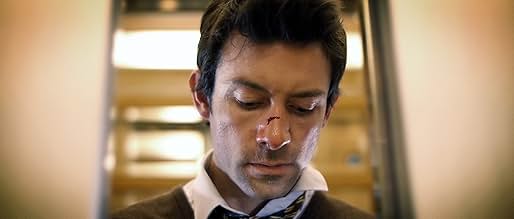Upstream Color
- 2013
- Tous publics
- 1h 36m
IMDb RATING
6.5/10
36K
YOUR RATING
A man and woman are drawn together, entangled in the life cycle of an ageless organism. Identity becomes an illusion as they struggle to assemble the loose fragments of wrecked lives.A man and woman are drawn together, entangled in the life cycle of an ageless organism. Identity becomes an illusion as they struggle to assemble the loose fragments of wrecked lives.A man and woman are drawn together, entangled in the life cycle of an ageless organism. Identity becomes an illusion as they struggle to assemble the loose fragments of wrecked lives.
- Awards
- 5 wins & 35 nominations total
Andreon Michael
- Peter
- (as Andreon Watson)
John Walpole
- Bank Investigator
- (as Trey Walpole)
- Director
- Writer
- All cast & crew
- Production, box office & more at IMDbPro
Featured reviews
Greetings again from the darkness. This is no typical movie, so these will not be typical comments. In 2004, Shane Carruth became something of a cult hero with the Sundance Festival crowd when his debut film PRIMER won a Grand Jury Award. Nine years later, we get his follow-up ... the ultimate artsy, indie film for those who thrive on analysis and prefer to avoid a story ending wrapped up with a neat bow.
These comments will not give you much, but I can tell you the screening had many viewers who left frustrated and confused. The fragmented narrative can be a bit disorienting and it avoids the usual staple of a resolution at the end. The audience knows more than the characters, yet the audience is baffled while the characters just continue on.
The first segment of the film is when it's at its most traditional. We see Thief (Thiago Martins) perform some type of worm/parasite procedure that slowly brainwashes Kris (Amy Seimetz) or leads to mind control or loss of personality ... just depends how you prefer to describe it. We then see The Sampler (Andrew Sensenig) help her overcome thanks to a blood transfusion on his pig farm. Yes, really. Finally, Kris bonds with Jeff (Shane Carruth) as they seek to reassemble their lives and re-discover themselves. Watching them bicker over who belongs to what memory is frightening and fascinating. It makes you question the definition of personal identity, and what if we lost that (or it was stolen).
Nature plays a huge role here, along with the connection to Thoreau's Walden. Many will use the term pretentious. Some will call it boring. Still others will be drawn in by the imagery and sound (or sometimes lack thereof). Shane Carruth does not fit Hollywood and neither do his films. He is a writer, producer, director, co-editor, cinematographer, and actor. He clearly has a love of the material and his choice of Amy Seimetz really makes the film work. She is outstanding (and also a filmmaker). The tired phrase "it's not for everyone" certainly applies here, but if you are a Terrence Malick fan or just enjoy being challenged by somewhat abstract themes, this one is worth a look.
These comments will not give you much, but I can tell you the screening had many viewers who left frustrated and confused. The fragmented narrative can be a bit disorienting and it avoids the usual staple of a resolution at the end. The audience knows more than the characters, yet the audience is baffled while the characters just continue on.
The first segment of the film is when it's at its most traditional. We see Thief (Thiago Martins) perform some type of worm/parasite procedure that slowly brainwashes Kris (Amy Seimetz) or leads to mind control or loss of personality ... just depends how you prefer to describe it. We then see The Sampler (Andrew Sensenig) help her overcome thanks to a blood transfusion on his pig farm. Yes, really. Finally, Kris bonds with Jeff (Shane Carruth) as they seek to reassemble their lives and re-discover themselves. Watching them bicker over who belongs to what memory is frightening and fascinating. It makes you question the definition of personal identity, and what if we lost that (or it was stolen).
Nature plays a huge role here, along with the connection to Thoreau's Walden. Many will use the term pretentious. Some will call it boring. Still others will be drawn in by the imagery and sound (or sometimes lack thereof). Shane Carruth does not fit Hollywood and neither do his films. He is a writer, producer, director, co-editor, cinematographer, and actor. He clearly has a love of the material and his choice of Amy Seimetz really makes the film work. She is outstanding (and also a filmmaker). The tired phrase "it's not for everyone" certainly applies here, but if you are a Terrence Malick fan or just enjoy being challenged by somewhat abstract themes, this one is worth a look.
Upstream Color is, by far, one of the absolute worst films I have ever seen. The movie is, and this is being nice, completely incomprehensible as a narrative work of film. It is nothing more than a bunch of random shots edited together with music and some occasional meaningless dialogue. It reminds me of the "video tests" people post to Vimeo when they're testing out their new still camera's video recording feature. The characters are never set up and the dialogue scenes are full of negative energy. As a result, I have absolutely no idea what they're talking about, I don't like them nor do I care what happens to them. I don't know what Shane Carruth was going for other than satisfying his own selfish need to vomit out this horrible tasting gallon of cryptic bile, but it certainly wasn't to try and entertain any human being with a normally functioning brain. I suspect the only reason this movie gets any press at all is due to its technical competency. That is, it looks like a properly shot movie and has a decent sound mix. If this movie had been shot "Dogme 95" style, I guarantee you would have walked out of the theater after 5 minutes instead of 10. The bottom line is that Shane Carruth does not respect a mainstream audience, and in fact takes every opportunity to insult them to their faces and mock them at the same time with this self-indulgent waste of projector lamp life.
Here's a film which ponders suffering and celebrates beauty and meaning, so at least on this count I am firmly behind it.
The point is how to have the lesson, for instance that love redeems, which we know in words but often eludes us in life as experience that needs no explaining beyond itself, as actual insight, as something which wrapping it around us we will know its warmth by simple feel.
Well, most serious films try something of the sort.
Usually how it works, is that there is an interplay of 'hard' and 'soft' elements. Hard would be all the stuff that particularize and discriminate, the more of these we have the harder it is to have unmediated insight because what happens in the story registers in a topical way, for instance a story of female Irish workers in the sewing industry of 1915. Soft is the flow of urges and self as one space for reflection, Malick's latest seems to be the pinnacle at around this time. Wong Kar Wai does it.
Usually, we start with some 'hard' particulars and open up in a 'soft' way, shedding self. But now and then, we get a major blunder like Cloud Atlas where the point is the soft insight of interconnected life but that is fenced on all sides by hard impositions, conspiracies, gunfights etc.
This is a weird, complicated narrative, unnecessarily so for my taste but once you see past the complexity, it is a simple thing. The idea is that there is something in nature which worms its way into the soul and is the cause of all suffering. Seemingly this is producing the anomalies that manifest in the narrative, if suffering sounds overly religious call it an existential dissatisfaction or malaise. We get to see the effect of this in a relationship between a man and woman, how what is eating them keeps tossing them apart and together again.
The 'soft' portion of the film is this tumultuous relationship, the point is it could be yours. We have digress, dissonance, reluctance, knowing and knowing the other so well you can't tell his memories from your own. Some marvellous birdwatching, love as agreeing on the same birds.
Kar Wai is king of this 'pure' emotional space, because he traces particulars faintly into the night, the yearning and alienation as something elusive in the air. Malick which this film reminds of, renders them as huge, abstract forces that buffet us, war or loss.
Here, the entire framework is schematic and 'hard' in the extreme, an actual worm, hypnosis, a sinister surgery of some kind, more clearly the man who keeps the pigs fenced and wanders around trying to 'capture' on tape the manifold sounds, which stands for a broader human endeavor.
I find that this approach cheapens and reduces. Suddenly it is about technology and greed, a clumsy set of metaphors.
So overall, this comes heavily on the side of a silly eccentricity. Next to Malick who is an influence in the solemnity of atmosphere, I was reminded at times of Synecdoche, Wax: Or the Invention of Television among the Bees, Southland Tales, even Begotten, all of them ambitious ventures constrained by a symbolic notation on the ideas.
The ending is so silly it has to be seen, the choice of metaphors is the most ludicrous since Cremaster which all but destroys the film.
The point is how to have the lesson, for instance that love redeems, which we know in words but often eludes us in life as experience that needs no explaining beyond itself, as actual insight, as something which wrapping it around us we will know its warmth by simple feel.
Well, most serious films try something of the sort.
Usually how it works, is that there is an interplay of 'hard' and 'soft' elements. Hard would be all the stuff that particularize and discriminate, the more of these we have the harder it is to have unmediated insight because what happens in the story registers in a topical way, for instance a story of female Irish workers in the sewing industry of 1915. Soft is the flow of urges and self as one space for reflection, Malick's latest seems to be the pinnacle at around this time. Wong Kar Wai does it.
Usually, we start with some 'hard' particulars and open up in a 'soft' way, shedding self. But now and then, we get a major blunder like Cloud Atlas where the point is the soft insight of interconnected life but that is fenced on all sides by hard impositions, conspiracies, gunfights etc.
This is a weird, complicated narrative, unnecessarily so for my taste but once you see past the complexity, it is a simple thing. The idea is that there is something in nature which worms its way into the soul and is the cause of all suffering. Seemingly this is producing the anomalies that manifest in the narrative, if suffering sounds overly religious call it an existential dissatisfaction or malaise. We get to see the effect of this in a relationship between a man and woman, how what is eating them keeps tossing them apart and together again.
The 'soft' portion of the film is this tumultuous relationship, the point is it could be yours. We have digress, dissonance, reluctance, knowing and knowing the other so well you can't tell his memories from your own. Some marvellous birdwatching, love as agreeing on the same birds.
Kar Wai is king of this 'pure' emotional space, because he traces particulars faintly into the night, the yearning and alienation as something elusive in the air. Malick which this film reminds of, renders them as huge, abstract forces that buffet us, war or loss.
Here, the entire framework is schematic and 'hard' in the extreme, an actual worm, hypnosis, a sinister surgery of some kind, more clearly the man who keeps the pigs fenced and wanders around trying to 'capture' on tape the manifold sounds, which stands for a broader human endeavor.
I find that this approach cheapens and reduces. Suddenly it is about technology and greed, a clumsy set of metaphors.
So overall, this comes heavily on the side of a silly eccentricity. Next to Malick who is an influence in the solemnity of atmosphere, I was reminded at times of Synecdoche, Wax: Or the Invention of Television among the Bees, Southland Tales, even Begotten, all of them ambitious ventures constrained by a symbolic notation on the ideas.
The ending is so silly it has to be seen, the choice of metaphors is the most ludicrous since Cremaster which all but destroys the film.
I attended this film solo (only one other person in the theater) which turned out to be a good thing as distractions were nil. Carruth has a lot of respect for the viewer. He doesn't do exposition. And if you pay close attention to this film, you wont need it. Unlike other reviews I've seen, I found Primer much harder to suss out than Upstream Color. There was a clear narrative here and the main protagonists arc is clear to see. I loved it. It was intense, beautifully shot, scored, and of course acted, especially by Amy Seimetz, the lead. She was amazing. If you like your films delivered to you on a silver platter, then this is not for you. But if you like to think a little bit, you will find the 90+ minutes of Upstream Color thoroughly enjoyable. I hope it does very well. And I hope Carruth doesn't take another 8 yrs to do his next one.
Ladies and gentlemen, I have rated this a 7.
Not going to go into why.
I don't see any 9&10 reviewers calling the 1&2 reviewers names or degrading them. So what's with the anger?
I love lots of different styles of books, music and films.
I played in a death metal band and screamed and growled almost impossible to understand lyrics.
One of my literature teachers heard one of our songs and asked me why so aggressive, messy and incoherent the music was. (It wasn't at all to me or our fans). I asked him to look at the water colour painting he had on the wall, it was one of his. I asked why the lines were blurred and colors mixed insrmtead of clear, sharp and defined lines; wouldn't that make the shapes and motives be easier to understand?
He just smiled and nodded.
If you don't like it, that's tooootally understandable. I don't like all the movies I watch either. And I might leave a comment about my experience.
But I really don't think those who did enjoy it have ANY need to lie or pretend as some of you have said, nor have anything to gain by writing an anaymous review here.
Hope we are more friendly here.
Did you know
- TriviaThe film that Kris is editing at the beginning of the movie is A Topiary, the film that Shane Carruth had begun production on before deciding to film Upstream Color instead.
- GoofsWhen the Sampler is incapacitating a pig with his instrument, the knot is thrown towards the pig's face and stretched. In the next frame, the wire knot is around the pig's body between its front & hind legs.
- ConnectionsFeatured in WatchMojo: Top 10 Best Sci-Fi Movies You've Probably Never Seen (2016)
- How long is Upstream Color?Powered by Alexa
Details
Box office
- Budget
- $50,000 (estimated)
- Gross US & Canada
- $444,098
- Opening weekend US & Canada
- $28,649
- Apr 7, 2013
- Gross worldwide
- $587,174
Contribute to this page
Suggest an edit or add missing content
































